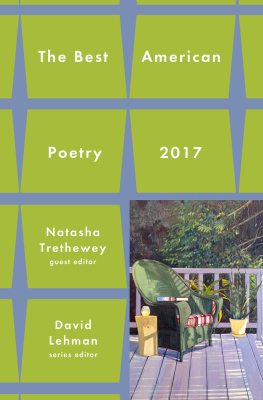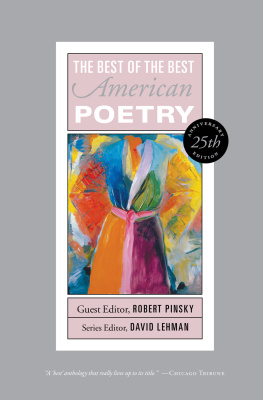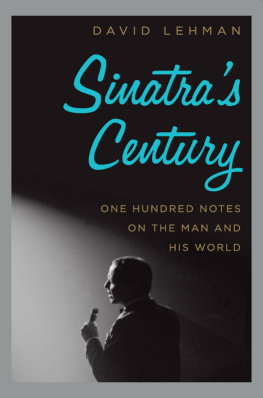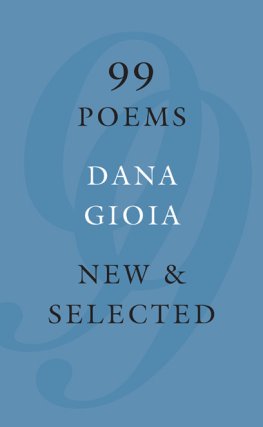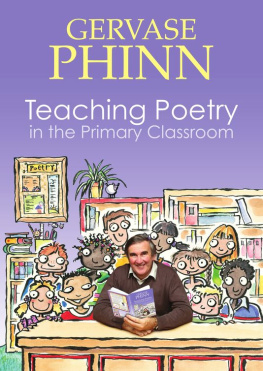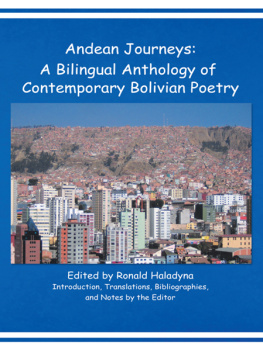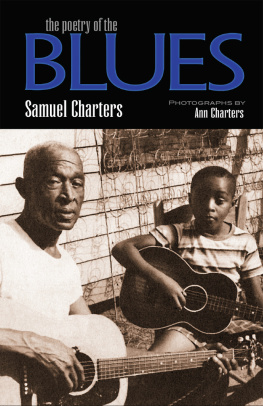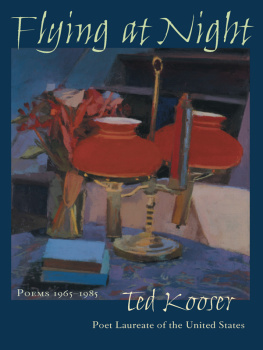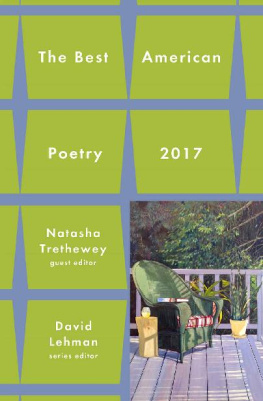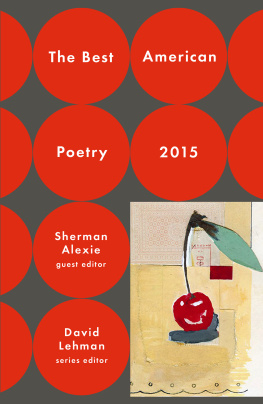Thank you for downloading this Simon & Schuster ebook.
Get a FREE ebook when you join our mailing list. Plus, get updates on new releases, deals, recommended reads, and more from Simon & Schuster. Click below to sign up and see terms and conditions.
CLICK HERE TO SIGN UP
Already a subscriber? Provide your email again so we can register this ebook and send you more of what you like to read. You will continue to receive exclusive offers in your inbox.
We hope you enjoyed reading this Simon & Schuster ebook.
Get a FREE ebook when you join our mailing list. Plus, get updates on new releases, deals, recommended reads, and more from Simon & Schuster. Click below to sign up and see terms and conditions.
CLICK HERE TO SIGN UP
Already a subscriber? Provide your email again so we can register this ebook and send you more of what you like to read. You will continue to receive exclusive offers in your inbox.
Praise for The Best American Poetry
Each year, a vivid snapshot of what a distinguished poet finds exciting, fresh, and memorable: and over the years, as good a comprehensive overview of contemporary poetry as there can be.
Robert Pinsky
The Best American Poetry series has become one of the mainstays of the poetry publication world. For each volume, a guest editor is enlisted to cull the collective output of large and small literary journals published that year to select seventy-five of the years best poems. The guest editor is also asked to write an introduction to the collection, and the anthologies would be indispensable for these essays alone; combined with [David] Lehmans state-of-poetry forewords and the guest editors introductions, these anthologies seem to capture the zeitgeist of the current attitudes in American poetry.
Academy of American Poets
A high volume of poetic greatness... in all of these volumes... there is brilliance, there is innovation, there are surprises.
The Villager
A years worth of the very best!
People
A preponderance of intelligent, straightforward poems.
Booklist
Certainly it attests to poetrys continuing vitality.
Publishers Weekly (starred review)
A best anthology that really lives up to its title.
Chicago Tribune
An essential purchase.
The Washington Post
For the small community of American poets, the Best American Poetry is the Michelin Guide , the Readers Digest , and the Prix Goncourt.
LObservateur

David Lehman was born in New York City. Educated at Stuyvesant High School and Columbia University, he spent two years as a Kellett Fellow at Clare College, Cambridge, and worked as Lionel Trillings research assistant upon his return from England. Poems in the Manner Of (2017), his most recent book, comprises poems written in imitation, appreciation, translation, or parody of poets from Catullus to Charles Bukowski. His eight earlier collections include New and Selected Poems (2013), When a Woman Loves a Man (2005), and The Daily Mirror: A Journal in Poetry (2000), all from Scribner. He is the editor of The Oxford Book of American Poetry (Oxford, 2006) and Great American Prose Poems: From Poe to the Present (Scribner, 2003), among other anthologies. Two prose books recently appeared: The State of the Art: A Chronicle of American Poetry, 19882014 (Pittsburgh), containing all the forewords he had written to date for The Best American Poetry , and Sinatras Century: One Hundred Notes on the Man and His World (HarperCollins). A Fine Romance: Jewish Songwriters, American Songs (Schocken) won the Deems Taylor Award from the American Society of Composers, Authors, and Publishers (ASCAP) in 2010. Lehman lives in New York City and in Ithaca, New York.
FOREWORD
by David Lehman

In 2017 one former guest editor of The Best American Poetry succeeded another when Kevin Young ( BAP 2011 ) was hired to take the place of Paul Muldoon ( BAP 2005 ) as poetry editor of The New Yorker . Paul, who continues to teach at Princeton, is the coauthor, with Jean Hanff Korelitz, of a critically acclaimed re-creation of the holiday feast in James Joyces The Dead. And for the first time in a decade, he is eligible to grace The New Yorker with a poetic tour de force on the order of Aubade, which ran in the January 29, 2018, issue.
As for Kevin, he left his post at Emory University to head the Schomburg Center for Research in Black Culture in New York City, where his first public appearances celebrated the Schomburgs acquisition of James Baldwins archives (a well-timed coup, said The New York Times ) and the life and legacy of tenor saxophonist Sonny Rollins, who used to practice on New Yorks Williamsburg Bridge (because no one complained about the noise) and for whom the bridge may someday be named.
For an admiring profile of Kevin Young that ran in Esquire , Robert Baird asked David Remnick, the editor of The New Yorker , who hired Young, why The New Yorker still publishes poems, as if that were a quixotic or archaic thing to do. Poetry is arguably, in some compressed and magical fashion, the highest form of expression, the greatest devotion we have to our most intricate invention, language itself, Remnick wrote in an email. How can we publish a magazine that proposes to be literary, as well as journalistic, that does not publish poetry?
The title Esquire s editors affixed to Bairds pieceCan Kevin Young Make Poetry Matter Again?echoes that of the essay Dana Gioia wrote for The Atlantic in 1991: Can Poetry Matter? In reaction to this echo, one can 1) revert to adage ( plus a change, plus cest la mme chose ), or 2) exclaim over the persistence of the worry, which seems to have outlived the related anxiety that either the novel or the author is dead, or 3) linger over some paradoxes. Perhaps never before have so many people written poetry despite the universally acknowledged truth that few folks buy poetry books. It is almost eerie, the number of people who want to be poets, Louise Glck remarked when working on The Best American Poetry 1993 , and the number has gone up in the twenty-five years since. An academic industry has grown around the teaching of poetry and other forms of creative writing, yet voices keep proclaiming that poetry is ready for the morgue, has forfeited its public responsibility, has lost its audience, has slid into irrelevance. A survey released by the National Endowment for the Arts in 2015 provides statistics to back up the gloom-and-doomsayers out there. If your idea of an active public is anyone who has read at least one poem in a calendar year, that public declined precipitously in the ten-year period ending in 2012 and is limited to 6.7 percent of the population. Do the math and you still get a hefty number of peopleuntil you remind yourself of how broad the category is and how low the figure would be if people were asked to name a living poet or to recite a couple of lines of verse.
Robert Baird, author of the Esquire piece, has written one of the most cogent critiques of, or laments for, poetry today. (There are plenty of bad ones.) Spend It All appeared on the Best American Poetry blog on January 13, 2012. The post begins with an arresting observation: Pass much time in the company of poetsyoung or old, online or offand soon enough youll find yourself privy to the cycles of consternation and dismay inspired by the general insignificance of poetry. This is undeniable even if one reflexively counters with the observation that America can now boast of having more poets per capita than ever in its history. Poetry has slipped beyond decadence into an eccentricity. Poetry lost the common reader a long time ago, if it ever had her, and from where I sit, it seems well on its way to losing the uncommon reader as well, Baird writes. Time was you had to know at least a little Larkin or Lowell or Creeley to count yourself a cultured intellectual, just as older times demanded you had to keep current with opera and ballet. No more. These days we feel like were shouldering our share of the civilizational burden if we keep up our subscription to The New York Times and
Next page
